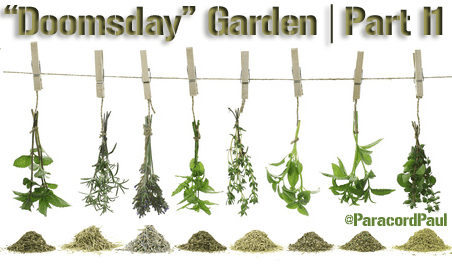Ten Great Medicinal Herbs for Prepping Your “Doomsday” Garden (Part II)

Previously. I surveyed five medicinal herbs. Remember that this list is in case of a natural disaster or societal collapse. We should all hope that we never face a day without access to medical care or supplies.
Let’s look at the other five herbs recommended for prepping your garden, shall we?
Garlic
Garlic is a terrific spice for cooking, but it has outstanding health benefits, and it can be taken often because it’s one of the safest herbs. However, it looks like cooking garlic will considerably weaken its anti-viral and anti-bacterial effectiveness. Eating it raw is a more potent way to stay healthy, but it will also drive everyone else away. If you’d rather not eat a clove of raw garlic, and if you can, try soaking a quarter pound of peeled garlic in a half quart of brandy, seal, shake each day, strain, and bottle after two weeks; then ingest 25-30 drops each day.
For flu, colds, cough, and respiratory infections, you can make a cough syrup from garlic if you’d prefer not to eat it raw — add a bit of honey to make it taste better if you want to. Likewise, garlic tea will aid in sore throats. Other internal uses that garlic can remedy are strep throat, ulcers, some viruses, high blood pressure, stomach cancer, blood thinning, bladder problems, colic in babies, and kidney issues.
Garlic has anti-infection in addition to anti-bacterial agents when used topically. For example, take a slice of garlic clove, briefly heat it in virgin olive oil, cool it, strain it, and then apply one or two drops to an aching ear or tooth. Additionally, you can create an ointment from a garlic clove to treat athlete’s foot, joint pain, wounds, skin infections, cuts, and any other kind of external fungus or skin irritation.
Peppermint
This is a beneficial herb — and it tastes good too! The Peppermint leaf makes a great tea and is a good cure for throat inflammation, cough, sinus infections, the common cold, heartburn, respiratory infections, menstrual cramps, nausea, irritable bowel syndrome, morning sickness, appetite stimulant, stomach cramps, vomiting, overgrowth of bacteria of the small intestine, diarrhea, gas, upset stomach, and muscle spasms.
Peppermint oil is suitable for external use for nerve pain, headaches, muscle pain, toothaches, itchiness, mouth inflammation, an allergic rash, joint conditions, viral and bacterial infections, and keeping away mosquitoes.
You could even inhale peppermint oil to heal the signs of colds and coughs or as a pain killer.
Sage
There are so many uses for this wonderful herb. Made as a tea, it can ease depression, relieve a sore throat when mixed with apple cider vinegar and salt and gargled, reduce gas, soothe digestion problems, lower blood sugar, minimize flu symptoms, and help upset stomachs.
Externally, as an astringent, sage can be used as an after-shave, to clean your teeth, and to freshen bad breath. It also makes a good antiperspirant because of its moisture-drying properties. This herb is essential for mouth ulcers and mouth sores due to sage’s irritant properties; make teas with equal parts of sage and chamomile and use it as a mouth rinse. A sage compress works well on wounds and cuts. For reducing fevers, add sage to a bath.
Tea Tree Oil
This excellent oil isn’t just an antiseptic and has anti-bacterial, anti-fungal, and anti-viral properties. So, even though it shouldn’t be ingested, tea tree oil still has many great uses.
Tea tree oil is a soothing anti-inflammatory and makes a good painkiller for the skin. You can apply it to your skin to heal minor burns, cuts, yeast infections, herpes, cold sores, abrasions, warts, insect bites, acne, athlete’s foot, lice, oily skin, rashes, carbuncles, and boils. Tea Tree Oil is also helpful for foot odor, blisters, toenail fungus, eczema, and dandruff.
It has many other uses as well. For example, you can inhale the steam of the oil to help with chest congestion and respiratory ailments like the common cold and sore throat, bronchitis, flu, asthma, and tuberculosis. In addition, the oil’s anti-viral agents fight many common infectious diseases, and inhaling the steam will also ward off shingles, chickenpox, and measles; it’ll also strengthen your immune system.
It’s great as a mouthwash to handle inflamed gums, bad breath, and plaque; you only need three drops in a cup of warm water two or three times daily. But never swallow the mouthwash. For laryngitis and canker sores, add three or four drops to a cup of warm water and gargle it twice a day — remember, don’t swallow the solution.
Thyme
Thyme is a potent herb, and you should take care when using it. When used externally, it could cause the skin to become irritated if you use too much. Likewise, internally, it should only be taken once a day.
Thyme can be made into a paste with some alcohol, used as an antiseptic for sores and skin inflammations, and cleanser for scabies, lice, crabs, and athlete’s foot. Thyme oil also works well as a mouthwash for bad breath and could be used for ear infections; the oil could be applied additionally to the scalp to aid baldness.
Thyme works well as a tea sweetened with a bit of honey to treat a sore throat, bronchitis, colic, whooping cough, bedwetting, arthritis, gas, skin disorders, upset stomach, parasitic worm infections, stomach pain, dyspraxia, and diarrhea. The tea can also be utilized as a urine disinfectant, a fever reducer, a diuretic that increases urine flow, and an appetite stimulant.
Again, this is just a preliminary list of herbs that are easy to grow in your garden to maintain your health. Researching and writing down the great benefits of common herbs that are worthwhile to plant in your garden is a good idea. You’ll then have a little pharmacy when a natural disaster arrives.
Furthermore, it would help if you made time to research herb combinations. The strength of herbal medicine will often be multiplied by mixing herbs that complement each other to develop a more effective remedy instead of using a single herb.
With the cold weather we are all experiencing, it’s tough to think about gardening, but Spring will be here before you know it, so get your ducks in a row so you can have your Medicinal Herb Garden planned and ready to go. Better yet, start your Herb Garden indoors.








